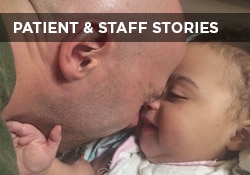This website uses cookies so that we can provide you with the best user experience possible. Cookie information is stored in your browser and performs functions such as recognising you when you return to our website and helping our team to understand which sections of the website you find most interesting and useful.

Susan E. Mazer, Ph.D. Blog
Thoughts and ideas on healthcare
Hi, and welcome to my blog! I'm Susan E. Mazer -- a knowledge expert and thought leader on how the environment of care impacts the patient experience. Topics I write about include safety, satisfaction, hospital noise, nursing, care at the bedside, and much more.
5 Ways To Be More Present for Your Patients
September 11, 2015
 Since recorded music was introduced, we have been able to capture a single performance of music forever, assuming that every time we listen to the recording, we hear the same thing.
Since recorded music was introduced, we have been able to capture a single performance of music forever, assuming that every time we listen to the recording, we hear the same thing.
Yes, whatever is recorded does not inherently change. However, we change. How we listen, the circumstances under which we choose to listen, and what we actually hear and perceive changes. In fact, no two listenings are the same.
As a musician, when I perform for an audience of 500 people, there are 500 different experiences of my performance, not just one. Oh, and add my own experience, as I am also a listener.
And, so it is with surgery or any medical procedure. Yes, the surgeon has replaced over 500 knees, but this time, it’s your knee.
And, yes, the chemotherapy drug has been given to hundreds of patients, but this time, you’re ingesting it. Even if your cancer has been diagnosed as typical of a certain kind of cancer, it’s still your cancer.
There is great risk in not being aware of the uniqueness of each patient, each injection, each surgery. This makes every surgery the first surgery. Yes, experience matters. But assuming sameness misses the unique nature of each event, which could significantly affect the patient experience.
Institutionalizing healthcare has long carried risk of indifference by narrowing protocols, policies, and patients into statistical generalizations. It blinds us to the “first time,” which is when our awareness is most acute.
Think about the first time you took a medical history, or dealt with an emergency unlike any other. How do we recapture the first time? How do we see the fifth patient of the day as the only patient?
This is the challenge inside the patient experience movement. It is hidden because we have to do everything that comes, before we can get to the first time. And yet, the details that live inside the patient are only partly informed by what we do.
From my experience as a musician, here are some hints that help me play a piece the first time after having played it for 25 years:
- Listen anew. Take nothing for granted. Don’t finish the sentence of the patient or abbreviate your message because you have said the same thing hundreds of times. Ask questions with concerned interest rather than routine indifference. When I was a patient, I had to ask the nurse and doctor to look at me when I was speaking to them instead of at the computer.
- Dress for the experience. What you wear, even if it is a uniform, can well be perceived as new to each patient your see. If it gets soiled, change it before you visit the next patient. Cleanliness of person represents cleanliness of the whole hospital.
- Stop and reset. Do this before you enter the patient’s room so that you do not carry the last patient you saw into this patient. Take a deep breath, focus, and consciously enter.
- Be fully present. Mindfulness is key to letting each patient know that he/she is receiving all of who you are while caring for him/her. Being a therapeutic presence to the patient and family is a healing modality, not a myth.
- Block out distractions. If the television is on and a distraction to the patient and/or to you, ask if you can turn if down or off so that you can hear every word. Your seriousness and related attentiveness will be met with engagement and appreciation.
Once you are aware of how you are with each patient, you may realize how unaware you may have been. This takes practice to be consciously present.
Dr. Jean Watson captured the urgency of our awareness: “Maybe this one moment, with this one [patient], is the reason we are here…at this time.”
Some days a will be easier than others. However, progress is a forward motion. You are so very important to every patient with whom you engage.
P.S. If you like this post, please do me a favor and share on LinkedIn, Twitter, Facebook, etc. Also to get automatic notices when a new post is published, subscribe (upper right). No spam – just great content. Thanks!










